Turkey elections: Young voters who could decide Turkey's future
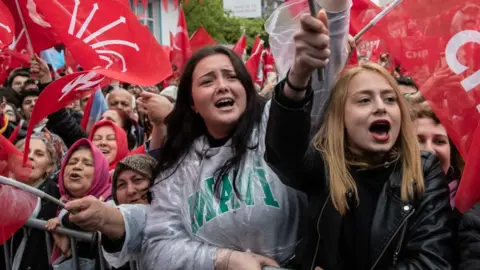 Getty Images
Getty Images"If Recep Tayyip Erdogan wins again, life will be a nightmare for all of us," said Perit, a 23-year-old Istanbul student.
He was jailed and spent almost two months in solitary confinement for taking part in a protest at the prestigious Bogazici University over the appointment of a pro-government dean.
Perit has voted only once before, and his friends Sude and Emru are among five million first-time voters who have known no other Turkish leader but Recep Tayyip Erdogan.
Life for young people in Turkey has become increasingly difficult, Emru complained, pointing to soaring inflation of currently 44% according to official figures.
"You can't afford to just study, you also have to get a full-time job to get by."
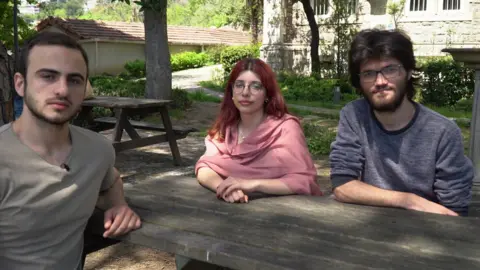
Like her friends, Sude plans to vote for the opposition in Sunday's presidential and parliamentary elections.
"I don't feel safe for expressing my emotions or opinions. Because whenever I do I get attacked," she said. She was handed a suspended jail sentence of 12 months earlier this year, for attending protests at Bogazici University.
Perit believes that after 20 years of Mr Erdogan and his AK Party in power, the time for change has come.
"Two decades is such a long time to change people's mentality: people's understanding of democracy and human rights. If Erdogan wins again this could be our last election. Regime could change."
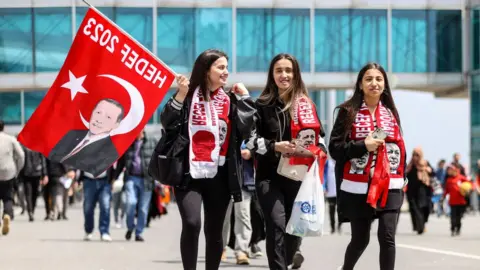 Getty Images
Getty ImagesThe election race is very tight and President Erdogan is facing his biggest challenge yet from opposition candidate Kemal Kilicdaroglu, who represents a bloc of six parties and has also secured the backing of more opposition groups.
The millions of of first-time voters make up almost 8% of the electorate, and many in Turkey see them as the largest group of undecided voters.
For Salih aged 20, the choice could not be clearer. "I think Recep Tayyip Erdogan is a charismatic leader, it's important to have such charisma in Turkish politics," he told the BBC.
He believes Mr Erdogan can build on his previous achievements, investing in Turkey's future.
"Previously there were problems over energy supply and Turkey was dependent on other countries militarily. But now we are producing our own cars, UAVs (drones) and aircraft. Mr Erdogan solved all our problems," he said.
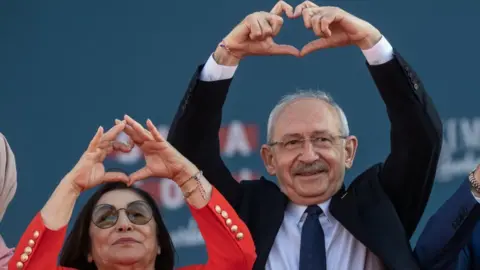 Getty Images
Getty ImagesUnsurprisingly all the candidates challenging for the presidency have tried to woo young voters.
While Mr Erdogan has emphasised advances in defence and technology, Mr Kilicdaroglu has promised greater freedoms and better employment prospects.
But Gizem, 20, argues it is the president who has improved freedoms in Turkey.
"Everyone is free to do whatever they like now. It was the opposition who curbed freedoms decades ago. Girls wearing headscarves like I do were not allowed in universities," she said.
One of Mr Erdogan's landmark reforms was to lift a decades-old ban on headscarves in universities and the civil service.
"If we have teachers, doctors, engineers wearing headscarves in this country today, that is all thanks to the freedoms Mr Erdogan has granted. If it wasn't for him, we would still be oppressed in the name of secularism," she explained.
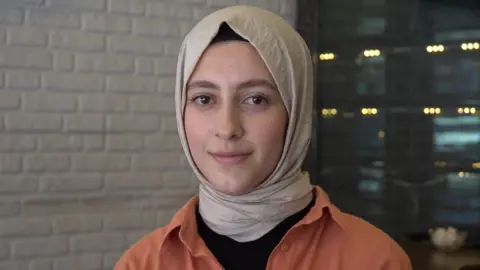
Mr Kilicdaroglu introduced a bill in parliament last year to secure the right of female public servants to wear headscarves. Mr Erdogan responded by offering to take the issue to a referendum instead. The issue has since been shelved.
Two other candidates are challenging for the presidency: Muharrem Ince, a nationalist centre-left politician and Sinan Ogan, from the nationalist right.
Recent polls suggest that both of them appeal mainly to young voters, so supporters of the main opposition bloc fear they could erode Mr Kilicdaroglu's vote and force the elections into a second round run-off two weeks later.
To win outright on Sunday, a candidate will have to secure more than half the vote.
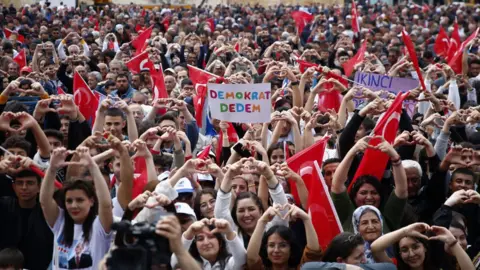 Getty Images
Getty ImagesThe votes of women will also be decisive, and they make up 50.6% of the whole electorate.
It is thought that conservative women helped bring Mr Erdogan to power two decades ago, but that support is now dwindling.
His decision to pull Turkey out of the Istanbul Convention - an international accord designed to protect women against domestic violence - has alienated many women and prompted large protests.
In the past he has referred to women who are not mothers "half a woman". He advised women to have at least three children and said men and women could not be treated equally.
One of the party's in his People's Alliance is an extreme Islamist party called Huda Par (Free Cause) and that has raised concerns among female MPs in his own AK Party.
Feminist Gulsum Kav argues the government does not believe in sexual equality and says women's freedoms have been curbed: "They get attacked for wearing shorts, female musicians are threatened with jail terms because of how they dress, and artists get sentenced for criticising a sex assault case."
"They want women to sit at home and do nothing. But women have changed. They will change Turkey too."
